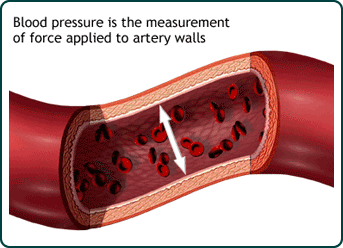High Blood Pressure Frequently Asked Questions (FAQs)

- What is high blood pressure?
- What are the symptoms of high blood pressure?
- What can you do to reduce your risk?
- How many Americans have high blood pressure?
- How much does high blood pressure cost the United States?
- What does the CDC do to address high blood pressure?
What is high blood pressure?
Blood pressure is the force of blood against your artery walls as it circulates through your body. Blood pressure normally rises and falls throughout the day, but it can cause health problems if it stays high for a long time. Find out more about high blood pressure.

What are the symptoms of high blood pressure?
High blood pressure is sometimes called the "silent killer" because it usually has no warning signs or symptoms. Many people do not know that they have high blood pressure. That’s why it's important to get your blood pressure checked regularly.
What can you do to reduce your risk?
There are several things that you can do to keep your blood pressure in a healthy range—
- Get your blood pressure checked regularly.
- Eat a healthy diet.
- Maintain a healthy weight.
- Be physically active.
- Limit alcohol use.
- Don’t smoke.
- Prevent or treat diabetes.
Find out more about preventing high blood pressure.
How many Americans have high blood pressure?
About 75 million American adults (29%) have high blood pressure—that’s 1 in every 3 American adults.1 Anyone, including children, can develop high blood pressure. It greatly increases the risk for heart disease and stroke, the first and third leading causes of death in the United States.
How much does high blood pressure cost the United States?
Total costs associated with high blood pressure in 2011 in the US were $46 billion in health care services, medications, and missed days of work.2
What does CDC do to address high blood pressure?
CDC runs several heart disease and stroke prevention programs that help people learn to prevent and control high blood pressure. CDC funds state efforts as well as a detailed national plan to reduce heart disease. For more information on these programs, see how CDC addresses high blood pressure.
References
- Merai R, Siegel C, Rakotz M, Basch P, Wright J, Wong B; DHSc., Thorpe P. CDC Grand Rounds: A Public Health Approach to Detect and Control Hypertension. MMWR Morb Mortal Wkly Rep. 2016 Nov 18;65(45):1261-1264
- Mozzafarian D, Benjamin EJ, Go AS, et al. Heart Disease and Stroke Statistics-2015 Update: a report from the American Heart Association. Circulation. 2015;e29-322.
- Page last reviewed: November 30, 2016
- Page last updated: November 30, 2016
- Content source:



 ShareCompartir
ShareCompartir